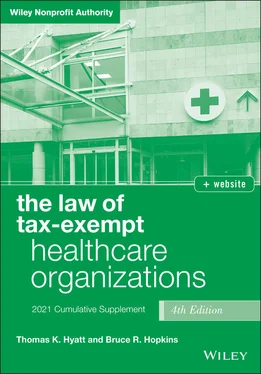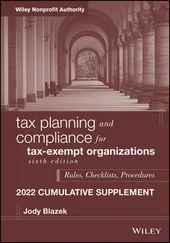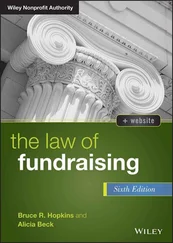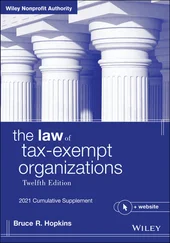Bruce R. Hopkins - The Law of Tax-Exempt Healthcare Organizations
Здесь есть возможность читать онлайн «Bruce R. Hopkins - The Law of Tax-Exempt Healthcare Organizations» — ознакомительный отрывок электронной книги совершенно бесплатно, а после прочтения отрывка купить полную версию. В некоторых случаях можно слушать аудио, скачать через торрент в формате fb2 и присутствует краткое содержание. Жанр: unrecognised, на английском языке. Описание произведения, (предисловие) а так же отзывы посетителей доступны на портале библиотеки ЛибКат.
- Название:The Law of Tax-Exempt Healthcare Organizations
- Автор:
- Жанр:
- Год:неизвестен
- ISBN:нет данных
- Рейтинг книги:4 / 5. Голосов: 1
-
Избранное:Добавить в избранное
- Отзывы:
-
Ваша оценка:
- 80
- 1
- 2
- 3
- 4
- 5
The Law of Tax-Exempt Healthcare Organizations: краткое содержание, описание и аннотация
Предлагаем к чтению аннотацию, описание, краткое содержание или предисловие (зависит от того, что написал сам автор книги «The Law of Tax-Exempt Healthcare Organizations»). Если вы не нашли необходимую информацию о книге — напишите в комментариях, мы постараемся отыскать её.
The Law of Tax-Exempt Healthcare Organizations — читать онлайн ознакомительный отрывок
Ниже представлен текст книги, разбитый по страницам. Система сохранения места последней прочитанной страницы, позволяет с удобством читать онлайн бесплатно книгу «The Law of Tax-Exempt Healthcare Organizations», без необходимости каждый раз заново искать на чём Вы остановились. Поставьте закладку, и сможете в любой момент перейти на страницу, на которой закончили чтение.
Интервал:
Закладка:
Mr. Hopkins is the Professor from Practice at the University of Kansas School of Law, where he teaches courses on the law of nonprofit and tax‐exempt organizations.
Mr. Hopkins served as Chair of the Committee on Exempt Organizations, Tax Section, American Bar Association; Chair, Section of Taxation, National Association of College and University Attorneys; and President, Planned Giving Study Group of Greater Washington, DC.
Mr. Hopkins is the series editor of Wiley's Nonprofit Law, Finance, and Management Series. In addition to coauthoring The Law of Tax‐Exempt Healthcare Organizations, Fourth Edition , he is the author of The Law of Tax‐Exempt Organizations, Twelfth Edition; Planning Guide for the Law of Tax‐Exempt Organizations: Strategies and Commentaries; Tax‐Exempt Organizations and Constitutional Law: Nonprofit Law as Shaped by the U.S. Supreme Court; Bruce R. Hopkins’ Nonprofit Law Dictionary; Bruce R. Hopkins’ Nonprofit Law Library (e‐book); IRS Audits of Tax‐Exempt Organizations: Policies, Practices, and Procedures; The Tax Law of Charitable Giving, Fifth Edition; The Law of Fundraising, Fifth Edition; The Tax Law of Private Foundations, Fifth Edition; The Tax Law of Associations; The Tax Law of Unrelated Business for Nonprofit Organizations; The Nonprofits’ Guide to Internet Communications Law; The Law of Intermediate Sanctions: A Guide for Nonprofits; Starting and Managing a Nonprofit Organization: A Legal Guide, Seventh Edition; Nonprofit Law Made Easy; Charitable Giving Law Made Easy; Private Foundation Law Made Easy; Fundraising Law Made Easy; 650 Essential Nonprofit Law Questions Answered; The First Legal Answer Book for Fund‐Raisers; The Second Legal Answer Book for Fund‐Raisers; The Legal Answer Book for Nonprofit Organizations; and The Second Legal Answer Book for Nonprofit Organizations . He is the coauthor, with David O. Middlebrook, of Nonprofit Law for Religious Organizations: Essential Questions and Answers; with Douglas K. Anning, Virginia C. Gross, and Thomas J. Schenkelberg, of The New Form 990: Law, Policy, and Preparation; with Ms. Gross, of Nonprofit Governance: Law, Practices & Trends; and with Ms. Gross and Mr. Schenkelberg, of Nonprofit Law for Colleges and Universities: Essential Questions and Answers for Officers, Directors, and Advisors . He also writes Bruce R. Hopkins’ Nonprofit Counsel , a monthly newsletter published by John Wiley & Sons.
Mr. Hopkins maintains a website providing information about the law of tax‐exempt organizations, including healthcare organizations, at www.brucerhopkinsbooks.com. Material posted on this site includes a periodically updated current developments outline and indexes for his newsletter. Mr. Hopkins received the 2007 Outstanding Nonprofit Lawyer Award (Vanguard Lifetime Achievement Award) from the American Bar Association, Section of Business Law, Committee on Nonprofit Corporations. He is listed in the Best Lawyers in America, Nonprofit Organizations/Charities Law, 2007–2021.
Mr. Hopkins earned his JD and LLM degrees at the George Washington University National Law Center, his SJD at the University of Kansas School of Law, and his BA at the University of Michigan. He is a member of the bars of the District of Columbia and the state of Missouri.
Book Citations
Throughout this book, 10 books by Bruce R. Hopkins (in some cases as co‐author), all published by John Wiley & Sons, Inc., are referenced in this way:
| Book | Cited As | |
| 1. | IRS Audits of Tax‐Exempt Organizations: Policies, Practices, and Procedures (2008) | IRS Audits |
| 2. | The Law of Fundraising, Fifth Edition (2013) | Fundraising |
| 3. | The Law of Tax‐Exempt Organizations, Twelfth Edition (2019) | Tax‐Exempt Organizations |
| 4. | The Law of Intermediate Sanctions: A Guide for Nonprofits (2003) | Intermediate Sanctions |
| 5. | Planning Guide for the Law of Tax‐Exempt Organizations: Strategies and Commentaries (2004) | Planning Guide |
| 6. | The Tax Law of Private Foundations, Fifth Edition (2018) | Private Foundations |
| 7. | Starting and Managing a Nonprofit Organization: A Legal Guide, Seventh Edition (2017) | Starting and Managing |
| 8. | The Tax Law of Charitable Giving, Fifth Edition (2014) | Charitable Giving |
| 9. | The Tax Law of Unrelated Business for Nonprofit Organizations (2005) | Unrelated Business |
| 10. | Tax‐Exempt Organizations and Constitutional Law: Nonprofit Law as Shaped by the Supreme Court (2012) | Constitutional Law |
The second, third, sixth, and eighth of these books are annually supplemented. Also, updates on all of the foregoing subjects (plus The Law of Tax‐Exempt Healthcare Organizations ) are available in Bruce R. Hopkins’ Nonprofit Counsel , a monthly newsletter, also published by Wiley.
CHAPTER ONE Tax‐Exempt Healthcare Organizations: An Overview
*§ 1.1 Constitutional Law Perspective
§ 1.2 Defining Tax‐Exempt Organizations
*§ 1.5 Charitable Healthcare Organizations
§ 1.8 Promotion of Health
*§ 1.10 ABLE Programs (New)
§ 1.1 CONSTITUTIONAL LAW PERSPECTIVE
*p. 6, note 14. Delete 132 S. Ct. 2566 and insert 567 U.S. 519.
*p. 6. Insert following first paragraph, before heading:
The penalty tax underlying the individual health insurance mandate (also known as the shared‐responsibility payment) was, however, reduced to zero, effective January 1, 2029. Thereafter, a federal district court held that the Patient Protection and Affordable Care Act is unconstitutional, on the ground that the individual mandate is no longer constitutional, in that its justification can no longer rest on Congress's power to tax, and that the mandate is inseverable from the Act's remaining provisions. 14.1 This court, observing that the mandate “no longer contains an exaction,” held that “[s]o long as the shared responsibility payment is zero, the saving construction articulated in NFIB is inapplicable and the individual mandate cannot be upheld under Congress's tax power.” 14.2 The court sifted through provisions of the Act, writings of Supreme Court justices in NFIB , and the legislation repealing the mandate to conclude that the mandate is “inseverable from the ACA,” being essential to the ACA's architecture.” 14.3 Congress, it wrote, “intended [the mandate] to place the Act's myriad parts in perfect tension”; “without it,” the “architectural design fails.” 14.4 “To find otherwise,” the court continued, “would be to introduce an entirely new regulatory scheme never intended by Congress or signed by the President.” 14.5 Thus, the court held that because the individual mandate, being so “interwoven” with the Act's “major” and “minor” provisions, is unconstitutional, “none [of the Act's provisions] can stand.” 14.6
This decision finding the individual mandate unconstitutional was affirmed, with the appellate court writing that “[n]ow that the shared responsibility payment amount is set at zero, the provision's saving construction is no longer available.” 14.7 The court of appeals, however, concluded that the severability analysis in the district court opinion is incomplete, directing the lower court to “employ a finer‐toothed comb on remand and conduct a more searching inquiry into which provisions of the ACA Congress intended to be inseverable from the individual mandate.” 14.8 The appellate court wrote that the district court opinion “does not do the necessary legwork of parsing through the over 900 pages of the post‐2017 ACA, explaining how particular segments are inextricably linked to the individual mandate.” 14.9 This court stated that it does “not hold forth on just how fine‐toothed that comb should be—the district court may use its best judgment to determine how best to break the ACA down into constituent groupings, segments, or provisions to be analyzed.” 14.10 Before the district court could act on remand, however, the Supreme Court assumed jurisdiction over the case. 14.11 The Fifth Circuit laid out the options for the Court: it may be that all of the Affordable Care Act is severable from the individual mandate, some of the Act is severable from the mandate and some is not, or none of the Act is severable from the mandate. 14.12
Читать дальшеИнтервал:
Закладка:
Похожие книги на «The Law of Tax-Exempt Healthcare Organizations»
Представляем Вашему вниманию похожие книги на «The Law of Tax-Exempt Healthcare Organizations» списком для выбора. Мы отобрали схожую по названию и смыслу литературу в надежде предоставить читателям больше вариантов отыскать новые, интересные, ещё непрочитанные произведения.
Обсуждение, отзывы о книге «The Law of Tax-Exempt Healthcare Organizations» и просто собственные мнения читателей. Оставьте ваши комментарии, напишите, что Вы думаете о произведении, его смысле или главных героях. Укажите что конкретно понравилось, а что нет, и почему Вы так считаете.












